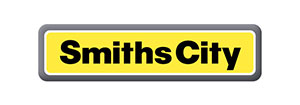Smiths City
Accueil » Ressources » Études de cas » Smiths City

Objectif Entreprise
Smiths City wanted to implement a secure, reliable method of exchanging documents with trading partners – while at the same time reducing keying errors and cutting back its paper mountain.
Benefices Entreprise
Overall document processing costs and error rates dramatically reduced.
Solutions B2BE
Smiths City - knocking off the paper mountain
Faxing thousands of orders a day is tiresome, insecure – and prone to errors. When retailer Smiths City needed to rethink the way it dispatched Purchase Orders to suppliers, it turned to B2BE (formerly called The ECN Group in New Zealand) and IBM MQSeries for a simple cost-effective solution.
Invoices, Purchase Orders, shipping instructions, customs declarations and statements – the volume of business documentation being dispatched in New Zealand every day is huge. In the past these critically important documents have typically been sent either by email – or printed out and faxed. Both methods are prone to failure however.
”In New Zealand email is the most commonly used method to transport business documents or do EDI (Electronic Data Interchange),” says B2BE’s Paul Hufflett. “But it’s inherently unreliable as a transport. It was only ever intended to be a person-to-person messaging system.
It’s clear text across the internet so it’s totally insecure and it was certainly never designed as a method of getting business documents from A to B.” Hufflett says problems can occur if an ISP has a service lapse – and a Purchase Order goes undelivered. “If the sender isn’t made aware of the delivery failure, then the purchase request will be lost. Or if the message is delivered more than once, too many purchases will occur.”
At Smiths City, IT manager Sim Lee says prior to a recent systems rethink, the Christchurch-based retailer was using the aforementioned print and fax method. “We sent Purchase Orders through a fax server,” he says, “but there was always the chance that either the order wouldn’t get through, or it would be entered incorrectly by our suppliers – because they had to manually re-key the faxed order into their systems.”

Opting for B2BE
As they were dispatching literally thousands of Purchase Orders a day, Lee says Smiths City decided it needed a secure reliable method of exchanging documents with trading partners. “We wanted to improve efficiency, eliminate human error and improve our B2B communications infrastructure.” First step, he says, was an approach to IBM – who recommended business partners B2BE as the implementation solution provider.
”What we wanted to do was send Purchase Orders to our suppliers electronically,” says Lee. “We thought about a range of ways we could have done that, on a one-to-one basis with our suppliers for example. But the sheer number of suppliers and Invoices prompted us to look for an easier answer.
IBM recommending B2BE was right for us. Essentially they’re a messaging broker, so they handle all the complexity of document conversion through to multiple companies on the other side – and we just deal with one party.”
Acting as a broker or hub, Hufflett says B2BE‘s service allows businesses to easily trade electronically with their customers, suppliers and other trading partners – without needing to buy, install or manage specialised software. With B2BE in the middle as a message broker, businesses can interact with each other he says, despite the fact that they may be operating entirely disparate internal applications.


The MQSeries solution
Before an Invoice or Purchase Order can be converted and dispatched by B2BE, however, it first has to reach them – and this crucial part of the business process is where MQSeries is proving invaluable says Hufflett.
”MQSeries provides a simple and reliable method of connecting to B2BE‘s business-to-business messaging service,” he says. “In terms of assisting a company to enter the world of ebusiness, MQSeries sits on the customer’s side and interfaces with MQSeries on our side.
Using MQSeries, a business can be 100% sure that documents from their legacy applications will be reliably delivered to us. We can support MQ on their side and effectively provide an end-to-end solution – as opposed to when customers send us Purchase Orders via email – in which case they have to take responsibility for getting it to our front door.”
Installation on legacy computer systems is simple, says Hufflett, as MQSeries can run on any one of 36 different operating systems. “That means nearly everyone can use it,” he says. “It doesn’t matter whether a client’s running Linux, Unix, Windows or AS400s – almost anyone can adopt MQ as a common approach to application integration.” Lee says this cross-platform flexibility was a deciding factor in Smiths City’s decision to install MQSeries.
”That was one of the main reasons we picked MQ,” he says, “because it runs on multiple platforms. We operate on Windows and iSeries, but MQSeries gives us that comfort factor if we ever wanted to change.”
In addition to gradually rolling out the MQSeries solution to other B2B processes, Lee says Smiths City also intend using it for its own internal integration projects. “We run multiple application systems here,” he says, “and they’ve all got their own data stores. So rather than being dictated to by what the application was originally designed for, we’ll develop a common front end and internal documents will be transported via MQ to satisfy the underlying application. By using MQ now we minimise any changes we’ll need to make in the future.”
Security concerns around computing infrastructure are also greatly reduced says Hufflett, as MQSeries allows businesses to trade more securely by eliminating the need for direct connections to trading partners – and the risks involved with allowing other businesses direct access to their host system.
Calculating return on investment Lee quickly points to a reduction in data-processing costs as an obvious benefit of installing MQSeries. “At one time we faxed thousands of Purchase Orders a day,” he says, “and just cutting back on all that paper has been an immediate benefit.
Somebody had to pick up all those faxes, and they got lost or the data wasn’t entered correctly. So the system basically pays for itself. And we don’t need to reinvent the wheel – whatever we’ve done now for one supplier, it’s quite easy to replicate for all our other suppliers.”
